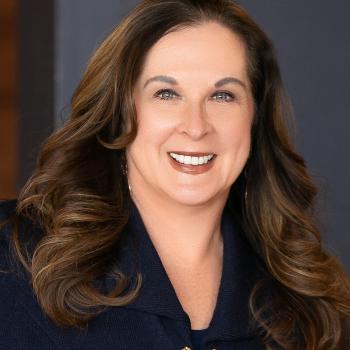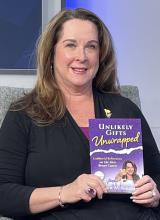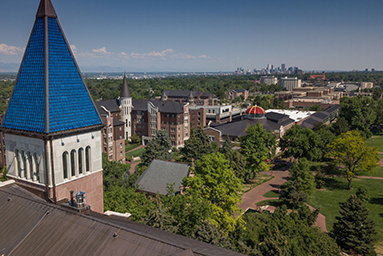Diane M. Simard: The Unlikely Architect of Healing
Celebrating National Cancer Survivors Month and a Decade of Impact at GSPP
In early 2015, Diane M. Simard was preparing to mark a milestone birthday. She had envisioned a season of reflection—perhaps a slower pace, a new chapter. Instead, a breast cancer diagnosis upended those plans and set her on a path of deep personal reckoning and unexpected professional purpose. What began as a health crisis soon evolved into a mission that would leave a lasting impact on the University of Denver’s Graduate School of Professional Psychology (GSPP).
Her treatment stretched across 10 months and included 16 rounds of chemotherapy, a lumpectomy, and radiation. “I wasn’t throwing up all the time—I finally figured out my anti-nausea meds—but I was exhausted by the cyclical nature of chemo,” she said. “I was so scared I was never going to feel good again.”
As the physical and emotional toll mounted, Simard asked her oncologist for a mental health referral—an ask that led to a realization: no one could refer her to a therapist who worked specifically with cancer patients. “I couldn’t believe that we have marriage and family therapists, sports psychologists, but no one trained specifically for cancer,” Simard said. “She told me, ‘I know they exist, but I don’t know of anyone who specializes in this area. If you find someone, let me know, because I need to refer a bunch of my patients.’ That’s all she had to say.”
She reached out to a former colleague who connected her with GSPP. “I walked into that meeting having just finished chemo, drenched in sweat from medically induced menopause, thinking, ‘Here we go,’” Simard said. “But it was Shelly Smith-Acuña who explained behavioral health science to me.” After learning GSPP was exploring ways to expand into this area, Simard didn’t hesitate. “Cancer’s happening to me. I feel like I need to do something.”
Within months, Simard collaborated with faculty and leadership to launch the Center for Oncology Psychology Excellence (COPE), which formally debuted in early 2016. “I needed something to hold onto—something to help get me out of my funk,” she said. “This wasn’t just about me. It was about bringing attention to a serious gap in care.” She envisioned GSPP as a training ground for pre-doctoral students who could bring compassionate, specialized care to people navigating the trauma of cancer. “I wanted GSPP to be a funnel—to train students before the postdoc level, and to provide tools for clinicians to address trauma, fear, and identity loss that often come with cancer.”
Today, COPE has been integrated into GSPP’s health psychology coursework—an academic sequence that has now reached nearly 600 students. “This is about more than just my story,” she said. “I’m trying to ensure that survivors, caregivers, and patients have access to clinicians who understand what it means to face your mortality.”
She emphasized how each experience with cancer is unique. “Ten people can have the same diagnosis and treatment plan, but they’ll experience it in ten different ways,” Simard said. “We have to treat the whole person.”
Beyond GSPP, Simard has helped launch the Ray of Hope Colorado Cancer Foundation’s mental health support program and has become a national voice on survivorship and psychosocial oncology. “We’re not medical commodities. We’re human beings,” she said. “If the healthcare system won’t center the patient’s mental health, then we will.”
She has also written three national award-winning books—The Unlikely Gift of Breast Cancer, Heal Forward, and Unlikely Gifts Unwrapped—which emerged from her journaling during treatment. “I’d always been the person writing about other people—propping them up with press releases,” she said. “But this was the first time I had a reason to write my own story.” Encouraged by friends and readers, she eventually published. “It was never about money or attention. It was about being part of the solution.”
Simard is often asked how she thinks about survivorship. “I’ve never really identified as a cancer survivor,” she said. “Cancer was a turning point. It was a milestone. It helped me accept myself and find confidence I didn’t know I had. That’s the crazy reason I call my books ‘unlikely gifts’—because cancer brought me so much clarity.” That clarity, she shared, gave her something else, too: permission to live as her most authentic self—unapologetically.
A sense of purpose now fuels her speaking engagements, advocacy efforts, and new projects. “I don’t have the answers. But I can connect people, raise awareness, and tell the truth,” she said. “I encourage people to get in tune with themselves. More self-love. More self-acceptance. Whatever that takes.”
Looking back on the impact of the health psychology coursework and her collaboration with GSPP, Simard remains focused on legacy over recognition. Her goal has always been to build something lasting—something that changes how mental health is addressed in cancer care. “I knew I wasn't going to heal unless I did something and continue to do something that was going to educate, offer solutions, invite dialogue and conversation,” she said.
“I care deeply about survivors, caregivers, and patients. I want them to feel seen, understood, and supported. If we can train clinicians to offer that kind of care—then that’s everything.” As for what lies ahead, she puts it simply: she plans “to focus on living and make the most of every day.”
To learn more about the high-quality, confidential mental health services we offer, visit GSPP Clinics.




